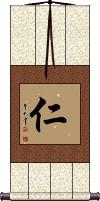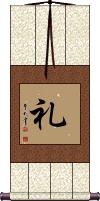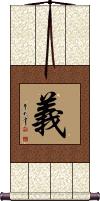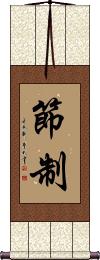Many custom options...
And formats...

Five Virtues in Chinese / Japanese...
Buy a Five Virtues calligraphy wall scroll here!
Personalize your custom “Five Virtues” project by clicking the button next to your favorite “Five Virtues” title below...
The Five Tenets of Confucius
The Five Cardinal Rules / Virtues of Confucius
仁義禮智信 are the core of Confucius's philosophy.
Simply stated:
仁 = Benevolence / Charity
義 = Justice / Rectitude
禮 = Courtesy / Politeness / Tact
智 = Wisdom / Knowledge
信 = Fidelity / Trust / Sincerity
Many of these concepts can be found in various religious teachings. It should be clearly understood that Confucianism is not a religion but should instead be considered a moral code for a proper and civilized society.
This title is also labeled “5 Confucian virtues.”
![]() If you order this from the Japanese calligrapher, expect the middle Kanji to be written in a more simple form (as seen to the right). This can also be romanized as "jin gi rei satoshi shin" in Japanese. Not all Japanese will recognize this as Confucian tenets but they will know all the meanings of the characters.
If you order this from the Japanese calligrapher, expect the middle Kanji to be written in a more simple form (as seen to the right). This can also be romanized as "jin gi rei satoshi shin" in Japanese. Not all Japanese will recognize this as Confucian tenets but they will know all the meanings of the characters.
See Also: Confucius Teachings | Ethics
Benevolence
Beyond benevolence, 仁 can also be defined as “charity” or “mercy” depending on context.
The deeper meaning suggests that one should pay alms to the poor, care for those in trouble, and take care of his fellow man (or woman).
仁 is one of the five tenets of Confucius. In fact, it is a subject that Confucius spent a great deal of time explaining to his disciples.
I have also seen this benevolent-related word translated as perfect virtue, selflessness, love for humanity, humaneness, goodness, goodwill, or simply “love” in the non-romantic form.
This is also a virtue of the Samurai Warrior
See our page with just Code of the Samurai / Bushido here
Respect
Politeness, Gratitude and Propriety
礼 is one of the five tenets of Confucius.
Beyond respect, 礼 can also be translated as propriety, good manners, politeness, rite, worship, or an expression of gratitude.
We show respect by speaking and acting with courtesy. We treat others with dignity and honor the rules of our family, school, and nation. Respect yourself, and others will respect you.
 Please note that Japanese use this simplified 礼 version of the original 禮 character for respect. 礼 also happens to be the same simplification used in mainland China. While 禮 is the traditional and original version, 礼 has been used as a shorthand version for many centuries. Click on the big 禮 character to the right if you want the Traditional Chinese and older Japanese versions.
Please note that Japanese use this simplified 礼 version of the original 禮 character for respect. 礼 also happens to be the same simplification used in mainland China. While 禮 is the traditional and original version, 礼 has been used as a shorthand version for many centuries. Click on the big 禮 character to the right if you want the Traditional Chinese and older Japanese versions.
This is also a virtue of the Samurai Warrior
See our page with just Code of the Samurai / Bushido here
See Also: Confucius
Justice / Rectitude / Right Decision
Also means: honor loyalty morality righteousness
義 is about doing the right thing or making the right decision, not because it's easy but because it's ethically and morally correct.
No matter the outcome or result, one does not lose face if tempering proper justice.
義 can also be defined as righteousness, justice, morality, honor, or “right conduct.” In a more expanded definition, it can mean loyalty to friends, loyalty to the public good, or patriotism. This idea of loyalty and friendship comes from the fact that you will treat those you are loyal to with morality and justice.
義 is also one of the five tenets of Confucius's doctrine.
![]() There's also an alternate version of this character sometimes seen in Bushido or Korean Taekwondo tenets. It's just the addition of a radical on the left side of the character. If you want this version, click on the image to the right instead of the button above.
There's also an alternate version of this character sometimes seen in Bushido or Korean Taekwondo tenets. It's just the addition of a radical on the left side of the character. If you want this version, click on the image to the right instead of the button above.
This is also a virtue of the Samurai Warrior
See our page with just Code of the Samurai / Bushido here
See Also: Judgment | Impartial | Confucius Tenets
Temperance
In short, 節制 or temperance is knowing when to say “when.”
Temperance is the practice of moderation and restraint (in fact, this Asian word is often translated as moderation or restraint).
It was one of the five tenets held to be vital to society in Hellenic culture. It is also one of the Four Cardinal Virtues considered central to Christian behavior by the Catholic Church.
Note: Also considered to be one of the Seven Heavenly Virtues.
This in-stock artwork might be what you are looking for, and ships right away...
Not the results for five virtues that you were looking for?
Below are some entries from our dictionary that may match your five virtues search...
| Characters If shown, 2nd row is Simp. Chinese |
Pronunciation Romanization |
Simple Dictionary Definition |
五常 see styles |
wǔ cháng wu3 chang2 wu ch`ang wu chang gojou / gojo ごじょう |
the five cardinal virtues in traditional Chinese ethics: benevolence 仁[ren2], justice 義|义[yi4], propriety 禮|礼[li3], wisdom 智[zhi4] and honor 信[xin4]; alternative term for 五倫|五伦[wu3lun2], the five cardinal relationships; alternative term for 五行[wu3xing2], the five elements the five cardinal Confucian virtues (justice, politeness, wisdom, fidelity and benevolence); (place-name) Gojō five constant [virtues] |
五徳 see styles |
gotoku ごとく |
(1) the five virtues (esp. in Confucianism); (2) tripod; three or four-legged kettle stand; (3) family crest in the shape of a three-legged kettle stand; (surname) Gotoku |
五德 see styles |
wǔ dé wu3 de2 wu te gotoku |
The five virtues, of which there are various definitions. The five virtues required in a confessor at the annual confessional ending the rainy retreat are: freedom from predilections, from anger, from fear, not easily deceived, discernment of shirkers of confession. Another group is the five virtues for a nurse of the sick, and there are others. |
五功德 see styles |
wǔ gōng dé wu3 gong1 de2 wu kung te go kudoku |
five kinds of virtues |
五種藏 五种藏 see styles |
wǔ zhǒng zàng wu3 zhong3 zang4 wu chung tsang goshu zō |
The five 'stores', or the five differentiations of the one Buddha-nature; (1) 如來藏 the Tathāgata-nature, which is the fundamental universal nature possessed by all the living: (2) 正法藏 the source or treasury of all right laws and virtues: (3) 法身藏 the storehouse of the dharmakāya obtained by all saints: (4) 出世藏 the eternal spiritual nature, free from earthly errors; (5) 自性淸淨藏 the storehouse of the pure Buddha-nature. Another similar group is 如來藏, 法界藏, 法身藏, 出世間上上藏, and 自性淸淨藏. |
五鈍使 五钝使 see styles |
wǔ dùn shǐ wu3 dun4 shi3 wu tun shih go donshi |
pañca-kleśa 五重滯; 五惑 The five dull, unintelligent, or stupid vices or temptations: 貪 desire, 嗔 anger or resentment, 癡 stupidity or foolishness, 慢 arrogance, 疑 doubt. Overcoming these constitutes the pañca-śīla, five virtues, v. 尸羅. Of the ten 十使 or agents the other five are styled 五利 keen, acute, intelligent, as they deal with higher qualities. |
三綱五常 三纲五常 see styles |
sān gāng wǔ cháng san1 gang1 wu3 chang2 san kang wu ch`ang san kang wu chang |
three principles and five virtues (idiom); the three rules (ruler guides subject, father guides son and husband guides wife) and five constant virtues of Confucianism (benevolence 仁, righteousness 義|义, propriety 禮|礼, wisdom 智 and fidelity 信) |
五常五戒 see styles |
wǔ cháng wǔ jiè wu3 chang2 wu3 jie4 wu ch`ang wu chieh wu chang wu chieh gojō gokai |
five constant virtues and five precepts |
五度無極 五度无极 see styles |
wǔ dù wú jí wu3 du4 wu2 ji2 wu tu wu chi godo mugoku |
the five pāramitās, the five supreme virtues leading to Buddhahood |
五種功德 五种功德 see styles |
wǔ zhǒng gōng dé wu3 zhong3 gong1 de2 wu chung kung te goshu kudoku |
five kinds of virtues |
戒師五德 戒师五德 see styles |
jiè shī wǔ dé jie4 shi1 wu3 de2 chieh shih wu te kaishi gotoku |
The five virtues of the teacher of the discipline: obedience to the rules, twenty years as monk, ability to explain the vinaya, meditation, ability to explain the abhidharma. |
自恣五德 see styles |
zì zì wǔ dé zi4 zi4 wu3 de2 tzu tzu wu te jishi go toku |
five virtues of freedom from restraint |
仁義礼智信 see styles |
jingireichishin / jingirechishin じんぎれいちしん |
the five Confucian virtues (benevolence, justice, courtesy, wisdom, and sincerity) |
The following table may be helpful for those studying Chinese or Japanese...
| Title | Characters | Romaji (Romanized Japanese) | Various forms of Romanized Chinese | |
| The Five Tenets of Confucius | 仁義禮智信 仁义礼智信 | jin gi rei tomo nobu jingireitomonobu | rén yì lǐ zhì xìn ren2 yi4 li3 zhi4 xin4 ren yi li zhi xin renyilizhixin | jen i li chih hsin jenilichihhsin |
| Benevolence | 仁 | jin | rén / ren2 / ren | jen |
| Respect | 禮 礼 | rei | lǐ / li3 / li | |
| Justice Rectitude Right Decision | 義 义 | gi | yì / yi4 / yi | i |
| Temperance | 節制 节制 | sessei / sesei | jié zhì / jie2 zhi4 / jie zhi / jiezhi | chieh chih / chiehchih |
| In some entries above you will see that characters have different versions above and below a line. In these cases, the characters above the line are Traditional Chinese, while the ones below are Simplified Chinese. | ||||
Successful Chinese Character and Japanese Kanji calligraphy searches within the last few hours...









